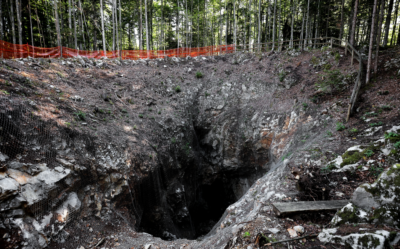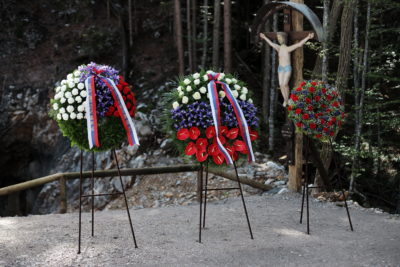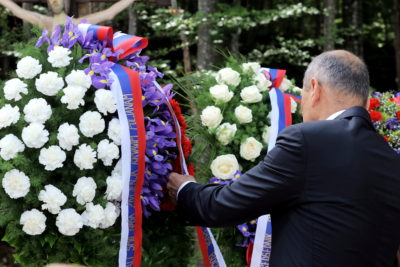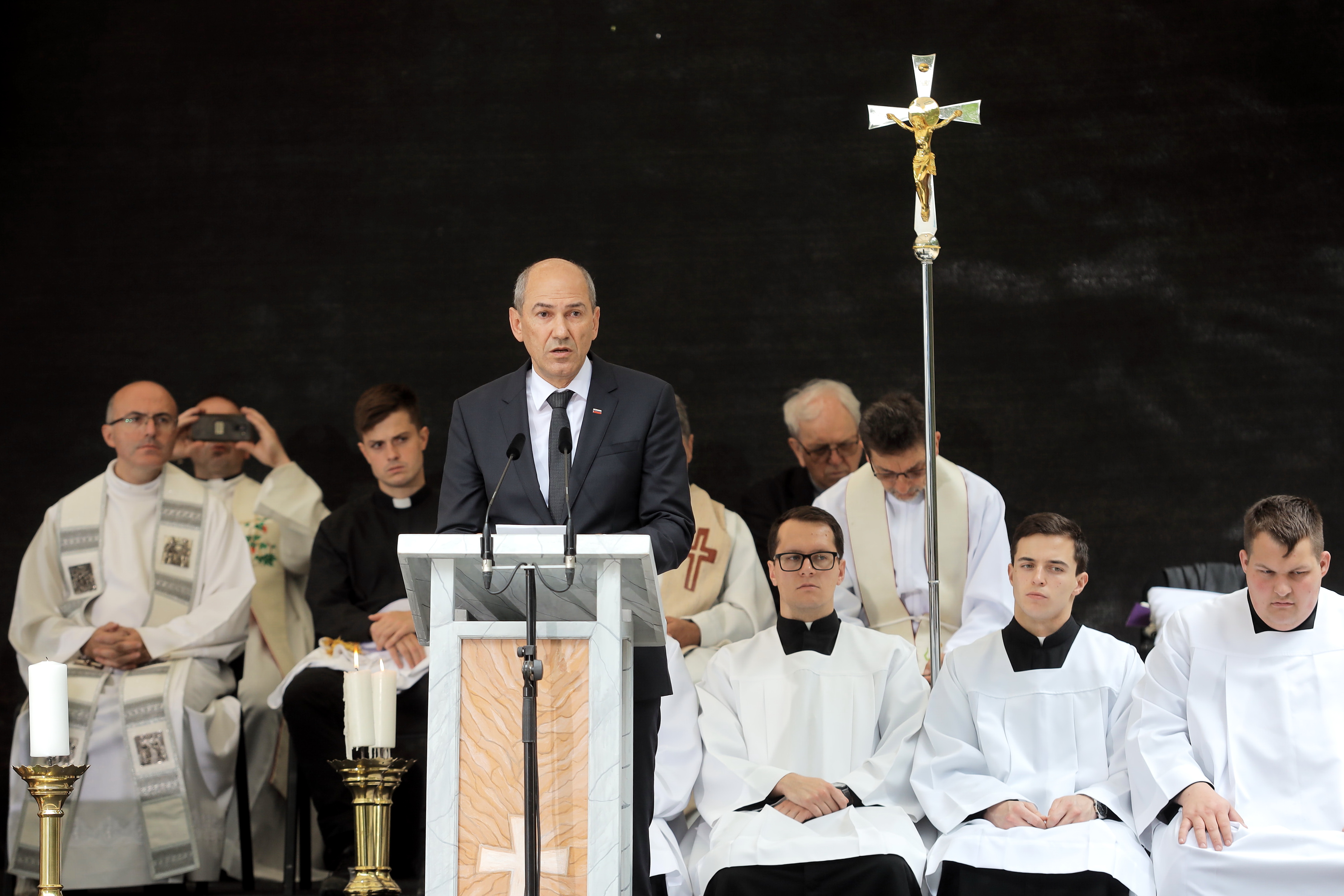Below, we are publishing the speech of the Prime Minister Janez Janša, which he gave at the anniversary memorial mass for the victims of revolutionary violence in Kočevski Rog, in its entirety. The mass was held by the Archbishop of Ljubljana, Stanislav Zore.
On June 25th, 1945, Edvard Kardelj sent a personal dispatch from Belgrade to Boris Kidrič in Ljubljana, demanding faster cleaning or – killing. The killing intensified, and my father also found himself in a train wagon headed for Kočevje. He was not even fourteen years old at the start of the war. Nevertheless, a year later, he was digging his own grave during a raid by the Italian occupying forces, then hid close to the new German-Italian border, guarded the Home Guard post in Polhov Gradec, escaped from prison at Ljubljana’s Castle, was sentenced to 20 months of forced labour and was sent to a German concentration camp – Dachau, withdrew with the Home Guard to Vetrinj, was returned to Yugoslavia, and was sent to the partisan camp in Šentvid nad Ljubljano. Then, right here, near Macesnova Gorica, together with hundreds of his young, even underage peers, he had to stand in front of the machine guns without any fair judgment, and even less guilt.
When he left the Home Guard post during the occupation to help on the farm at home, and then escaped from the German prison, he was tried and punished – he was sent to Dachau as a deserter. And later, he was sent to the abyss and into death in Kočevski Rog, by the liberators, without a verdict and without being guilty of anything. The hell of this place of slaughter and the time among those who suffered, dying around him, left a mark on him forever. What the assassin’s bullet missed, the regime made up for with a reign of fear that killed the memory and the truth. The time of unimaginable horror and the threat of death shaped the new phrase among the good people, which said: “It is better if you do not know.”

The truth was so horrible that we did not even believe the fragments of it we heard at first. But it lived, nevertheless, in small islands, in some churches, abroad and around the world, among those rescued and protected. And among the murderers who knew the end was coming, during the many sleepless nights.
The 20th century gave birth to two great evils in Europe. National Socialism and Communism. Hundreds of millions of people have suffered from both. Slovenian people in particular, and even earlier, our fellow citizens from the Primorska region, experienced the terrors of fascism. The two great evils imitated each other and competed with each other in their atrocities. Both were genocidal. Evil is evil because of its character and the consequences of its actions, and not because of its ideological cloak. The evil that confronts its double does not become good just because of the confrontation. Evil is not permanently eliminated neither by revenge, nor by oblivion, but only by the rule of law.
It is human nature to resist injustice. It is human nature to want to live a free and dignified life. An individual who was pushed into a whirlwind of occupation and civil war and wanted to stay true to himself, however, was often left with no good choice.

But resistance to any kind of evil was legitimate. That is why we respect all those who fought against fascism, National Socialism, and Communism. All who have died in or because of this resistance, have a right to a name and a memory, they deserve a decent grave and our respect. Only this can be a permanent basis for the reconciliation of Slovenians. Something that the relatives of the slain and all well-meaning people sincerely wanted at that first mourning ceremony here in Rog, 30 years ago, but they were deceived. That is why we are only now, after 75 years, today for the first time, here at the site of a large massacre of Slovenians. And we will achieve reconciliation. Sometime in the future. Unfortunately, not today, as the words “they should have killed more of them,” and calls and death threats for the second-class citizens are still part of our everyday lives. Many are more disturbed by the non-ban of a concert than by the eerie echo of the language, which was used to justify mass murder and crimes against humanity at this exact spot. Therefore, instead of living with each other, we are still striving to not live one against the other, but at least next to each other. So far, we are somewhat successful in this. However, in this holy place of horror, we must clearly let those, who are once again publicly threatening death on the streets and squares of Ljubljana, know: we will not allow you to push Slovenians back into the war of pitting brother against brother. This blind hatred has already caused too much misery. We will do whatever it takes to make sure you fail at this.
For, even buried in everyday problems and challenges, we should still not overlook the point:
What can we say, today, to those compatriots, who left their young lives in this abyss below Macesnova Gorica, or to those in Smrečje, near Turjak, who died under the gunfire of the anti-communist side just before the end of the war? United and finally reconciled in death, they have been silently staring at us, asking us for 75 years: “Did you learn anything from our death and sacrifice?”
Yes. The truth about your and my father’s fate, which lay on us with its full weight just before independence, testified to where a national divide can lead during a fateful time with such force that we did everything we could, half a century later, to prevent anything that would lead us in a familiar, terrifying direction once more. And it worked.
The second, post-war generation, personified here in a unique way by the President Borut Pahor and I, managed to reach the end of the fight – an independent Slovenian state in 1991, despite all of the bad predictions and prospects, without fraternal blood being shed in this incredible, miraculous feat of the nation. Therefore, we have the right to bury everyone in marked graves, without distinctions. To return among the civilized nations. To accept all those who died into our communion, so that we can become whole again. To deny hatred the right to our homeland and to focus on the fundamental goal of our constitutional anthem, which says: let peace, glad, conciliation, come back to us throughout the land.
On the very same day, June 25h, 1991, exactly 46 years after the terrible order of cleansing, we Slovenians, in spite of everything, set up an independent state. The idea, dreamed up at Svete Višarje and coined with the May Declaration, became real.

Despite the fatal divide, Slovenians indisputably have a period in our recent history that has largely unified us and united us with a noble goal. We have the central value of our nation. We have time, which is unifying. We have a holy day, when, for the first time in its history, the Slovenian nation really did write its own judgment.
It was glorious, this judgment, and if it were repeated today, the results of the plebiscite would be similar. And when the hour of the trial came, we defended the decision of the nation together, the sons of Partisans and Home Guards. The sons of the persecuted and expelled emigrants volunteered for the Slovenian territorial defence. Therefore: let’s work for reconciliation, heal the wounds, protect the memory, and the truth. Let us place the time that united us on the pedestal of Slovenian statehood.
Then, we will be working for the good of future generations of our descendants. We have a constitution and constitutional values that are common and the same for everyone. We have independence. We have common national and state symbols. We have a beautiful homeland; we have the garden of the world, that has no equal. When the hardest trials come, we always prove we can get through them. We will be able, albeit late, to return the name and memory to all those who were not buried. To all our dead. Be healthy, homeland. God bless you.
Janez Janša

